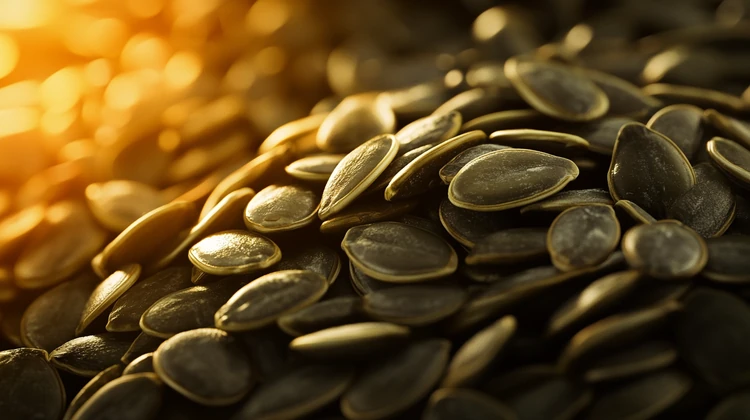Roasting the seeds properly can help

Could Googles hottest recipe search spell health issues? Maybe. Pumpkin seeds, while a nutritional powerhouse, do come with a few considerations to keep in mind. As with many nutrient-dense foods, there could be side effects that run from mild allergic reactions to difficulty breathing.
Pumpkin seeds are nutritional superstars, so to speak. Theyre packed with lots of health fats, antioxidants, magnesium, and zinc and even offer some pluses you might not think about, like a reduced risk of breast cancer. But, it's essential to consume them mindfully.
The potential problem spots
The biggest fork in the road is eating too much. Savory or not eating too many pumpkin seeds can cause stomach upset, diarrhea, bloating, constipation, or gas. This is because pumpkin seeds are high in fiber.
Then, theres allergic reactions. Some people may experience itching, rash, vomiting, swelling in the face and throat, flushing, wheezing, faintness, and shock. Not exactly the prettiest of pictures, but WebMD says that pumpkin seeds should be eaten in medicinal amounts.
Pumpkin seeds are a good source of several minerals, including magnesium, zinc and potassium. While these minerals are essential for various bodily functions, drug interactions can occur, too especially with blood thinners, diuretics, and blood pressure medicine.
Speaking of blood pressure, pumpkin seeds are antioxidants which means they can help lower blood pressure, but they may not be safe for people with low blood pressure.
If youre trying to lose some weight, then pumpkin seeds arent your answer, either, because pumpkin seeds are high in calories and fat. Pumpkin seeds have 126 calories in one ounce equal to two tablespoons so, comparatively, about the same as nuts.
Packed with fiber, but is it too much fiber?
Pumpkin seeds are naturally rich in fiber, which is fantastic for promoting healthy digestion and regularity. There is one caveat to the fiber, though," Judith Wylie-Rosett, a professor and division head for health promotion and nutrition research at New York's Albert Einstein College of Medicine, said.
"If somebody has not been eating very much fiber at all, and they then eat a large quantity of pumpkin seeds they may end up with some digestive-tract disturbance, meaning increased gas, bloating, or even loose stools. For people who experience GERD (acid reflux), theres also the possibility of causing esophageal problems.
To avoid this, the best bet for people who experience digestive and gastro-type issues would be to gradually increase the intake of pumpkin seeds, allowing their digestive system to adapt, ensure theyre drinking plenty of water throughout the day, and chew the seeds thoroughly.
Lastly, the salty side of pumpkin seeds should also be considered. If you're watching your sodium intake, opt for unsalted or lightly salted varieties, or consider roasting them yourself at home with minimal or no added salt.
If youre going to bake some pumpkin seeds, follow these steps
If youre smitten with the Google recipe search results about pumpkin seeds, Ally Rosen, MS, RDN, CPT, tells RealSimple that you should follow one simple step: roast them. Its not a cure-all, but it can help reduce the level of phytic acid and make them a bit more digestion-friendly.
Rosen suggests the easiest way to eat whole pumpkin seeds is to roast them on a baking sheet at 350 degrees in a preheated oven for about 10 minutes, or until they turn golden brown. I'll just add a touch of sea salt and roast them on a sheet tray in the oven, let them cool, and add them as a great, crunchy topping for salads and grain bowls, Rosen said.
Photo Credit: Consumer Affairs News Department Images
Posted: 2024-10-15 14:05:31



















